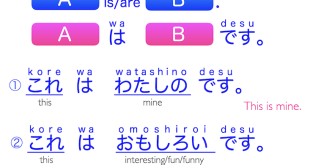Japanese Verbs te form (てform)
Some grammatical patterns are commonly used with te (て) form.
1. Vてから、 ~ 。: After V, …….
1, 毎朝 ご飯を 食べてから、 コーヒーを飲みます。
Maiasa gohan o tabete kara, kōhī o nomimasu.
Every morning, I drink coffee after eating.
2, レポートは この本を 読んでから、書いてください。
Repōto wa kono-pon o yonde kara, kaite kudasai.
Please write the report after reading this book.
2. Vても いい。: V is also / can V (express permission)
1, ここで 写真を とっても いいです。
Koko de shashin o tottemo īdesu.
It’s nice to take a picture here.
2, ここに すわっても いいです。
Koko ni suwatte mo īdesu.
It’s fine to sit here.
A: すみません、ここで タバコを すってもいいですか。
Sumimasen, koko de tabakowo sutte mo īdesu ka.
Excuse me, can I smoke here?
B: はい、いいです。
Hai, īdesu.
Yes, it is OK.
3. Vても かまいません(かまわない)。: V is also okay / okay (maybe) V (allowed, likely)
1, このレストランでは カードで はらっても かまいません。
Kono resutorande wa kādo de haratte mo kamaimasen.
You can also pay by credit card at this restaurant.
2, 用事が あったら、早く 帰っても かまいません。
Yōji ga attara, hayaku kaette mo kamaimasen.
If there’s something busy, it’s okay to go home.
4. Vて ください。: Let V (dictate)
1, ちょっと まってください。
Chotto matte kudasai.
Please wait a moment.
2, このかみに あなたの名前を 書いて ください。
Kono kami ni anata no namae o kaite kudasai.
Please write your name on this sheet.
5. Vて います。: is…
Current sentence, Describing status, frequently occurring habits, occupation …
1, いま 音楽を 聞いています。
Ima ongaku o kiite imasu.
I’m listening to music now.
2, Yamaha会社は バイクを つくっています。
Yamaha kaisha wa baiku o tsukutte imasu.
Yamaha company is producing motorcycles.
3, 私は HonDa会社で 働いています。
Watashi wa HonDa kaisha de hataraite imasu.
I am working at Honda company.
4, 私は ねるまえに、 本を 読んでいます。
Watashi wa neru mae ni, hon o yonde imasu.
I often read books before going to bed.
6. Vては いけません。: Prohibit…. (forbidden)
1, ここで タバコを すっては いけません。
Koko de tabakowo sutte wa ikemasen.
Don’t smoke here.
2, あぶないですから、入っては いけません。
Abunaidesukara, haitte wa ikemasen.
It’s dangerous, so don’t enter.
7. V1て、V2て、...Vます/Vました。: V1 and V2…. V
List your actions in chronological order.
まいあさ 私は 6時半におきて、 朝ごはんを 食べて、 それから 学校へ いきます。
Mai asa watashi wa 6-jihan ni okite, asa gohan o tabete, sorekara gakkō e ikimasu.
Every morning I wake up at 6:30, eat breakfast, then go to school.
8. S1ても(でも)、 S2。: Although S1, but S2
1, くすりを のんでも、 元気に なりません。
Kusuri o non demo, genki ni narimasen.
Although taking medicine but still not well.
2, やくそくしましたから、雨がふっても、 来ます。
Yaku sokushimashitakara, ame ga futte mo, kimasu.
Because I have an appointment, even the rain I come.
9. Vて あげます。: Do …. ( others)
Vて くれます。 : Do …. (others do it for me)
Vて もらいます。 : Received …. (From others)
1, 父に ネクタイを かってあげました。
Chichi ni nekutai o katte agemashita.
I bought a tie for my dad.
2, 彼は 私に 日本語を 教えて くれました。
Kare wa watashi ni nihongo o oshiete kuremashita.
He taught me Japanese.
3, 私は 彼に お金を貸して もらいますた。
Watashi wa kare ni okane o kashite moraimasuta.
I was lent money from him.
10.Vて いただけませんか。: Please … .. (ask others to do something for me)
Vて くださいませんか。
1, すみません、この漢字の読み方を 教えて くださいませんか。
Sumimasen, kono kanji no yomikata o oshiete kudasaimasen ka
Excuse me, could you please tell me how to read this kanji?
2, 日本語で レポートを 書いたんですが、チェックしていただけませんか。
Nihongo de repōto o kaita ndesuga, chekku shite itadakemasen ka.
I wrote the report in Japanese, could you please check it out?
11.Vて います。: is
V: Intransitive verbs. used to describe the resulting state of the action.
1, まどが 開いています。
Mado ga aiteimasu.
The window’s open.
2, きのうの台風で あそこに 木が たおれています。
Kinō no taifū de asoko ni ki ga taorete imasu.
There are fallen trees over there because of yesterday’s storm.
12.Vて あります。: There is
V: transitive verbs, describing the state of the remaining action result.
1, 部屋の かべに ちずが はってあります。
Heya no ka be ni chizu ga hatte arimasu.
There is a map hanging on the wall.
2, 机の上に 本が おいてあります。
Tsukue no ue ni hon ga oite arimasu.
There is a book on the table.
13.Vて しまいます。: Completed something, regretted what happened.
1, この本を 全部 読んでしまいました。
Kono-pon o zenbu yonde shimaimashita.
I have finished reading this book.
2, タクシーに さいふを 忘れて しまいました。
Takushī ni sa ifu o wasurete shimaimashita.
I forgot the wallet on the taxi.
14.Vて おきます。: Do V first (prepare first), keep the state.
明日のパーテイーの飲み物を買っておきます。
Ashita no pāteī no nomimono o katte okimasu.
I’ll buy a drink for tomorrow’s party.
A: このしりょう、 かたづけましょうか。
Konoshi ryō, katadzukemashou ka.
Let me clean up this document.
B: いいえ、まだ使いますから、そのままに して おいてください。
Īe, mada tsukaimasukara, sonomama ni shite oite kudasai.
No, I will still use it, so please leave it as it is.
15.V1て、~。: Because …. ( causative)
V1なくて、 ~。
A(い)くて、 ~。
A(な) で、~。
N で、~。
1, ニュースを聞いて、びっくりしますた。
Nyūsu o kiite, bikkuri shimasuta.
I was surprised to hear the news.
2, このもんだいは ふくざつで、分かりません。
Kono mondai wa fukuzatsude, wakarimasen.
Because this problem is complicated, I do not understand.
Attention:
– is the verb indicating the speaker’s mood, V has no will, V ability, adjectives for mood ….
16. Vて みます。: Try doing V
1, 新しいシャツーを 着てみます。
Atarashī shatsū o kite mimasu.
I try on a new shirt.
2, もう一度 かんがえて みてください。
Mōichido kangaete mite kudasai.
Let’s think about it one more time.
17. Vて きます。:
Do something, go somewhere (will come back)
1, 私は きっぷを 買って きます。
Watashi wa kippu o katte kimasu.
I go buy tickets. (then back)
2, ちょっと でかけて 来ます。
Chotto dekakete kimasu.
I go out for a bit. (then back)
 Learn Japanese Free Learn Japanese Free
Learn Japanese Free Learn Japanese Free







